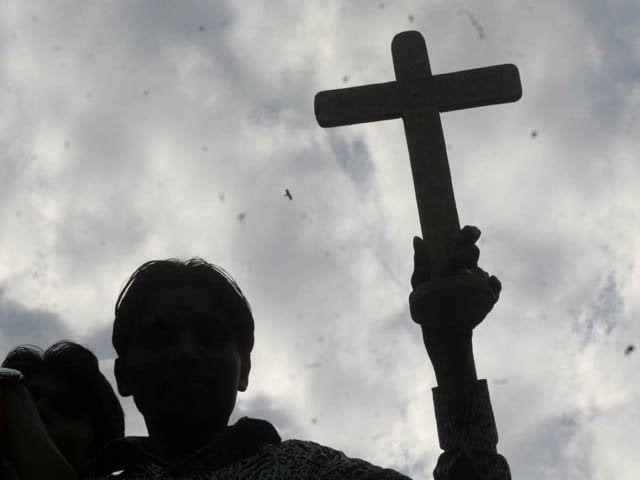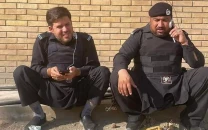Pakistan police failing to comply with blasphemy law procedures: US report
The religious freedom report highlights the situation of minorities and rights in Pakistan during the past year

The religious freedom report highlights the situation of minorities and rights in Pakistan during the past year. PHOTO: FILE
Civil society groups continued to voice their concern over misuse of the blasphemy laws in the country, while citing the Mashal Khan case verdict as the example of misconstrued facts and the complexities surrounding the law in the country.
Due to several procedural irregularities and deficiencies numerous other blasphemy cases too remained pending in the courts at the year end, including the Aasia Bibi case, impending since October 2016.
The US State Department’s ‘International Religious Freedom Report’ for the year 2017 reported the situation of minorities and religious freedom rights in Pakistan during the past year.
Previously placed on a Special Watch List for having engaged in or tolerated severe violations of religious freedom under the International Religious Freedom Act of 1998, following the report the US Commission on International religious Freedom has again repeated its recommendation to declare Pakistan as a ‘county of special concern’.
The report notes the government and civil society’s efforts in dealing with sectarian conflicts and violence against minorities. According to the report, counter-terrorism actions persecuted by the Civil and military leadership under the National Action Plan included an explicit goal of countering sectarian hate speech and extremism.
US religious freedom panel eyes Pakistan with worry
Yet the laws remained less helpful to the accused in blasphemy cases as in numerous such cases the police failed to comply with the law requiring a senior police official to investigate any blasphemy charge before a complaint can be filed.
Further, proceedings in the legislative houses to amend laws following the court directives witnessed slow, partial or no implementation. As the directive from the Islamabad High Court, to revise the penal code to make the penalties for false accusations of blasphemy commensurate with those for committing blasphemy awaited implementation till the year end.
Blasphemy cases and laws remained at the forefront of Pakistan’s societal and political realm. Not just with individual cases, on national political front too political discourse remain embroiled with debates and subsequent backlash from different religious-political factions over the matter.
One of which led to weeks long protest in the Federal capital over the change to the Parliamentarian oath affirming the belief in the finality of Prophet hood into a declaration. Throughout the year, Islamic organisations with varying degrees of political affiliation held rallies and other events to support the doctrine of the finality of the Prophet Muhammad.
Escalating pressure on the government also resulted in strict monitoring and surveillance of online content. Islamabad High Court Justice Shaukat Aziz Siddiqui instructed the government to block websites containing blasphemous material following which the government initiated a high profile crackdown on the blasphemous content on the social media.
In his order, Siddiqui called blasphemers “the biggest terrorists” and warned that if the government did not take action against them, “the patience of the followers of Holy Prophet (Peace be Upon Him) may run out of control. The Pakistan Telecommunication Authority too, circulated text messages deeming uploading or sharing of blasphemous content on social media a punishable offense under the law.
The regulatory body also took action against 188 websites and blocked 3,025 websites for containing blasphemous material. The courts awarded the first ever death sentence to a Shia Muslim, from Punjab on charges of posting blasphemous material on social media platforms.
On the contrary, the government’s mediatory efforts, albeit insufficient also helped diffuse and prevent intercommunal mob violence, including a federal minister, diffused tensions over an interfaith marriage in Qaidabad, Punjab. Procedural reforms to discourage misuse of the blasphemy laws remained under the debate in the lower and upper legislation houses of the country.
The government continued its efforts to enforce its previous bans on the activities of, and membership in, some religiously oriented groups it judged to be extremist or terrorist. The Ministry of Interior maintained a multitier schedule of groups that were either banned or had their activities monitored and curtailed. The schedule included individuals whose activities in the public sphere could also be curtailed.
Increasing government supervision of madrassahs remained a component of the NAP, and there was evidence of continued government efforts to increase regulation of the sector. Although, many madrassahs failed to register with one of five waqafs (religious endowments) or with the government, to provide to the government documentation of their sources of funding, or to accept foreign students only with valid student visas, a background check, and the consent of their governments, as required by law.
To protect minorities from bonded labour and forced conversions the National Commission for Minorities, a government committee created in 2014 with representatives from Christian, Hindu, Muslim, and Sikh communities, met sporadically to develop a national policy for minorities.
Religious freedom violations: Pakistan rejects being placed on US watch list
The commission voiced its concern for minority members not being given protection against bonded labour in the brick-making and agricultural sectors, an illegal practice which disproportionately enslaves Christians and Hindus.
The commission demanded that the Punjab Prohibition of Child Labour at Brick Kilns Act 2016, prohibiting the use of child labour in the brick industry be implemented in other provinces too. Under the amended law, the penalty for employing children has been increased from six months’ imprisonment to five years’ imprisonment and a maximum fine of 500,000 rupees ($4,500).
To stop forced conversions of minorities, a bill passed by the Sindh Assembly in November 2016 criminalising forced conversions remains stalled when the governor declined its ratification, disappointing religious minority activists.
The report also cites the figures from the South Asia Terrorism Portal, stating that 231 persons were killed and 691 injured in 16 incidents of sectarian violence during the year. There continued to be violence and abuses committed by armed sectarian groups connected to militant organisations banned by the government, as well as abuses by individuals and groups designated as terrorist organisations by the United States and other governments.
Muslim minority groups too remained victims to sectarian violence, as recorded by some civil society groups 220 Shia were killed in at least 18 sectarian incidents during the year. Terrorist groups targeted markets three times in the Shia majority city of Parachinar, Kurram Agency, Federally Administered Tribal Agency.



















COMMENTS
Comments are moderated and generally will be posted if they are on-topic and not abusive.
For more information, please see our Comments FAQ